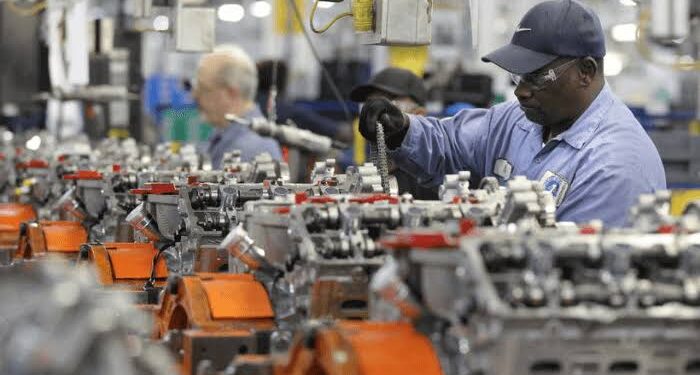Industry stakeholders have expressed deep concerns as Nigeria’s services sector rapidly outpaces the real sector, widening the economy’s structural imbalance.
They warned that the development reinforces Nigeria’s structural defects, undermining industrialisation since the real sector remains the growth foundation.
According to official data, Nigeria’s real sector, mainly manufacturing and agriculture, has recorded six consecutive years of declining contributions.
Between 2020 and 2024, the manufacturing sector contributed only 8.8 percent to GDP, while agriculture contributed about 25.5 percent.
Comparatively, the services sector performed strongly, averaging 54.9 percent contributions during the same period, significantly overshadowing real sector performance.
National Bureau of Statistics (NBS) data revealed that manufacturing contributed 8.99 percent in 2020 and maintained similar levels in 2021.
The share slightly dipped to 8.91 percent in 2022, 8.64 percent in 2023, and then fell further to 8.41 percent in 2024.
Agriculture fared no better, contributing 26.21 percent in 2020 before gradually dropping to 24.64 percent by the close of 2024.
Meanwhile, the services sector surged from 52.44 percent in 2020 to 56.89 percent in 2024, consolidating its dominance over the economy.
During the first quarter of 2025, GDP rebasing temporarily lifted manufacturing contributions to 9.62 percent, but experts described gains as misleading.
Instead of narrowing the gap, the services sector climbed further to 57.50 percent, worsening the imbalance against real sector performance.
Agriculture also suffered another setback, recording 23.33 percent in early 2025, thereby deepening worries among industry observers about structural stability.
The Director General of the Manufacturers Association of Nigeria (MAN), Segun Ajayi-Kadir, lamented consistent underperformance within the industrial and manufacturing sectors.
He emphasised that manufacturing remains fragile across sub-sectors, recording negative average growth of -0.76 percent between 2019 and 2024.
Ajayi-Kadir stressed that despite GDP rebasing, Nigeria’s economy remains statistically larger without genuine productivity gains or deeper industrialisation.
He argued that industrial output continues to decline, with the sector’s GDP share dropping from 27.65 percent to 21.08 percent.
Critical sub-sectors like oil refining and motor vehicle assembly consistently underperform, further weakening Nigeria’s industrial and economic competitiveness.
The MAN boss concluded that Nigeria must urgently re-industrialise to drive inclusive growth, diversify exports, and reduce dependence on commodities.
































